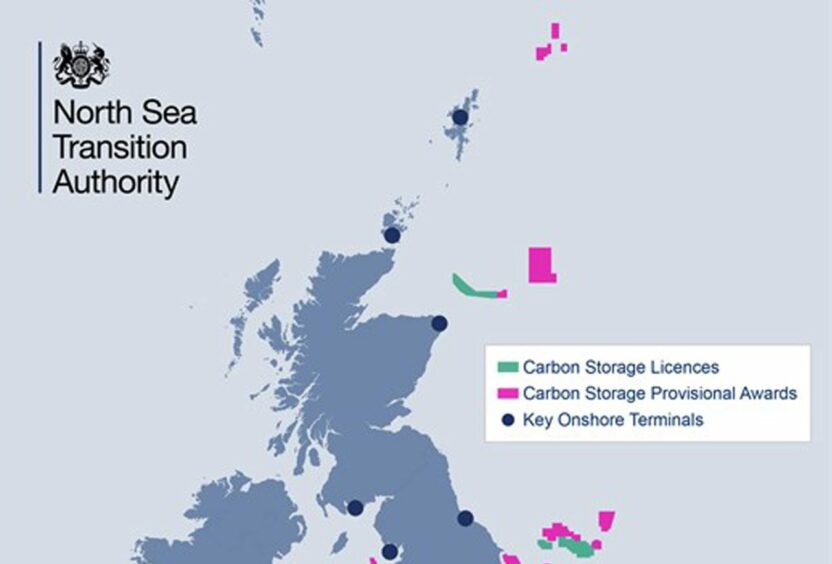
The UK North Sea regulator announced yesterday that offers for its first ever carbon capture utilisation and storage (CCS) licensing round have been made.
Those successful haven’t been named yet by the NSTA for commercial confidentiality reasons, and the fact that some may not take up its offers.
Some have already announced of their own volition – but they are only a fraction of the 12 total which the NSTA said had been made offers (others firms are rumoured, but not announced).
For the NSTA, that differs from typical oil and gas licensing rounds when winners, maps – the works – have traditionally been disclosed on the day.
Winners who accept their offers are expected to be disclosed in coming weeks.
Right now, they could be mulling things over, and there are reasons some firms might not accept these CCS offers.
Why wouldn’t a firm accept an offer?
Just because the NSTA has made an offer, it doesn’t mean it will be accepted. There’s a few reasons for that, like portfolio rationalisation, competition and the windfall tax.
A company, for example, may have made a bid for a certain seabed space, but found their subsequent offer is only for a portion of that space due to competition for that area.
That could ultimately be a different business proposition, potentially with a need for collaboration and sharing of resources, which they need to weigh up.
Also of note: the round opened in June of last year, before the UK Government increased its levy of the industry through more stringent windfall tax rules in November.
One industry insider, who did not wish to be named, noted that some firms could have made their bids in between these windfall tax announcements – and could be reassessing their positions as a result.
Harbour Energy, for example, has previously warned this taxation could undermine their ability to invest in areas like CCS in the UK.
Better prospects elsewhere?
Other considerations are on international competition and companies rationalising their exposure to CCS; Shell recently pulled out of the Northern Endurance Partnership in Teesside to focus on the Acorn project in Aberdeenshire.
Stuart Haszeldine, director of the Scottish Carbon Capture and Storage group and an Edinburgh University professor, said there are “good commercial reasons” why the winners aren’t disclosed.
Noting the Shell move, he said “the ownerships and the spread-betting individual companies are choosing is now becoming a bit more refined”.
He added: “Many of these very large companies, the supermajor oil companies, also have plenty of options in the US, where they’re going to get paid more money, more quickly for storing CO2 because of the 45Q tax.
“We’re in a very dynamic situation and it’s quite possible some of those companies may have bid for two or three different blocks and then find they’ve been successful elsewhere in the world, and so they’re balancing their risk and may wish to take only one of those blocks in the UK.”
Step change in decarbonisation
Professor John Underhill, director of Aberdeen University’s Centre for Energy Transition, said the announcement represents a “step change in the effort to decarbonise the UK”, and was positive on firms accepting their offers.
“It is not a surprise that the license award winners have not been named as they have a period of time to consider whether they wish to accept the NSTA’s offer.
“But on the presumption they will accept the binding well and seismic work program, I would anticipate the licensees, their joint venture partners and commitments to be announced by the NSTA in the coming weeks.”
On the windfall tax and the “fiscal conditions that impact investment in the North Sea,” Professor Underhill said he would “still anticipate all of the bidders accepting the offers and expect some companies to pre-empt the full announcement by issuing their own press release stating they are accepting the offer.”
Some firms have indeed already announced their offers via press release.
Pace of CCS licensing round to development
Professor Haszeldine praised the NSTA, adding that the round gives “strong encouragement that the UK is open for business”.
One key issue for SCCS is the pace of development, and the NSTA’s announcement yesterday said first injection “within a decade”.
Professor Haszeldine said “that’s way too slow”, noting that timescales “have been slipping” on widescale CCS across the UK.
“A decade is a long time, that would be an extreme slip in to 2033.
“Remember, the whole of the UK’s electricity system is supposed to be decarbonised by 2035, so they’re going to have to have CCS operating by that time on all of the gas-fuelled power stations, which seems very optimistic.”
Equally, there’s been long delays in getting the first two CCS clusters up and running – Scotland’s Acorn project in Aberdeenshire is still waiting for track 2 funding a year-and-a-half since the track 1 announcement.
On timelines, Professor Underhill of Aberdeen said: “If the sites are shown to be viable geologically and not affected by well integrity, co-location and marine spatial planning issues or other issues, the 10-year to first injection and storage is perfectly feasible, something that has been ably demonstrated in Denmark, where the Greensands project saw Carbon Dioxide injection take place earlier this year.”

 © SCCS
© SCCS © Supplied by Aberdeen University
© Supplied by Aberdeen University